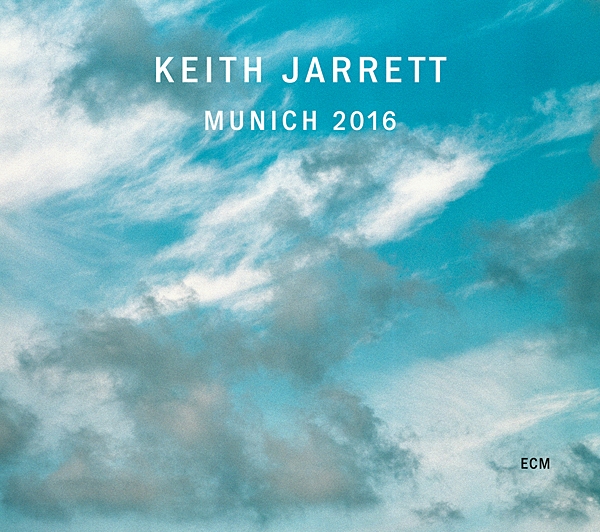| Columns Retired Columns & Blogs |
Not only a great review of the music, but also of the context and placing it in his discography.
I feel pretty lucky to have been able to enjoy Jarrett's solo pieces. They are life enhancers, for sure!

I just measured the Keith Jarrett shelf in my CD library and it's 25" long: 51 CDs and CD sets. But when I played the new Munich 2016, I felt like I was rediscovering him after an unexplained absence.
Jarrett has been off my radar lately. Apparently I am not alone. The single best indicator of a jazz musician's critical standing is the DownBeat International Critics Poll. In 2017, Jarrett did not make the top 10 in the piano category. In 2018, he did not make the top 20.
Jarrett's lower profile is partly because he has not performed in public in more than two years. It's not because ECM has stopped putting out Jarrett records: The flow of Jarrett releases has been steady. But, with one exception (Creation, in 2015), it's all been older stuff from the ECM vaults.
But now there's Munich 2016, from July 16, 2016, the last night of Jarrett's most recent European tour. It's the newest Jarrett music currently available. Listening to it reminded me of something I knew but had momentarily forgotten: Keith Jarrett is our greatest living jazz pianist.
This is a solo concert, of the totally improvised live genre that Jarrett invented in 1973 with Solo Concerts: Bremen/Lausanne and continued in 1975 with The Köln Concert. These performances, sometimes more than an hour in length, were astonishing onslaughts of spontaneous creativity. They demanded much from the listener—patience, openness, imaginative engagement, and a good attention span—which makes their commercial success no less astonishing. Sales of The Köln Concert have exceeded 3.5 million copies.
Since 1983, Jarrett's primary format has been his "Standards Trio" with Gary Peacock and Jack DeJohnette, but he never stopped performing and recording solo concerts, or not for very long. In 2005, with Radiance, he fundamentally altered the model. He discontinued those gigantic hour-long outpourings and began to string together much shorter improvised segments. Munich 2016 contains 12 separate pieces.
Those of us who loved the original solo concert albums had a tough time with the change. The sheer excess of the long solo concerts was thrilling. To be swept up in Jarrett's streams of musical consciousness was to transcend the role of passive listener and feel like a creative participant.
If Munich 2016 does not reach the heights of earlier solo concert albums like La Scala, it is nonetheless an imposing achievement. Jarrett still sets his hands free to flow into motivic continuums and harmonic epiphanies and polyrhythmic furies and melodic revelations, all of which could have been discovered in no other way.
Part I churns and circles in place for 14 minutes, a turbulent pool of thematic recurrence. It has no shape except energy. Part II turns this evening in Munich suddenly inward, as Jarrett ponders and searches and comes upon a fragile tone poem. Carefully, beautifully, he marks it out. He gradually frees it to ring forth until it finds silence. Part III extends this rapt atmosphere, in what sounds like a ballad you almost know, or perhaps a folk song, or even a hymn. It is a song in the moment, snatched from free air. (At the end of Part III, the crowd erupts. Munich is into it.) Part IV is a startling outbreak of dance, a wicked groove.
So the suite unfolds. Part V is pure disembodied lyricism, but Part VI may reflect back to the formality of Part II. The two-minute Part VII may draw upon the intensity of Part I. Part VIII is a mesmerizing meditation that climbs and falls away and ascends again. The three-minute Part IX prances like Part IV. Parts X and XI merge into one act, a pattern within the greater design, the towering arc of this concert.
The immediacy of the listener's experience is not separable from the lifelike recorded sound achieved by the ECM team: executive producer Manfred Eicher, engineer Martin Pearson, and mastering engineer Christoph Stickel. There is a close focus on the piano, but it is placed in the ambient acoustic environment of the Munich Philharmonic Hall.
For an encore, Jarrett makes a choice he never would have made in 1973. After creating 12 spontaneous compositions, he plays three standard ballads. "Answer Me, My Love," "It's a Lonesome Old Town," and "Somewhere Over the Rainbow" are traced with a devotion that lights them from within and makes extended improvisation unnecessary. They complete the musical and spiritual journey. This night is one song.—Thomas Conrad

Not only a great review of the music, but also of the context and placing it in his discography.
I feel pretty lucky to have been able to enjoy Jarrett's solo pieces. They are life enhancers, for sure!


25’ or 25” ?
Good spotting - Thanks. It should have been 25" - now correct.
John Atkinson
Technical Editor, Stereophile

...the two albums that he recorded with Charlie Haden at the studio in his home.
Yes, they are from the 'standard song book' but they are particularly memorable because Haden passed away a year or two after.
RIP Charlie Haden.